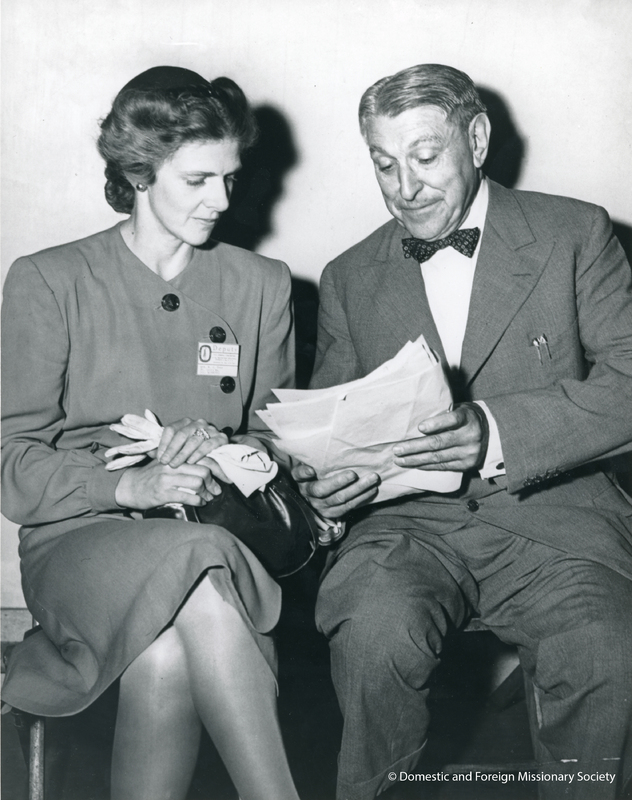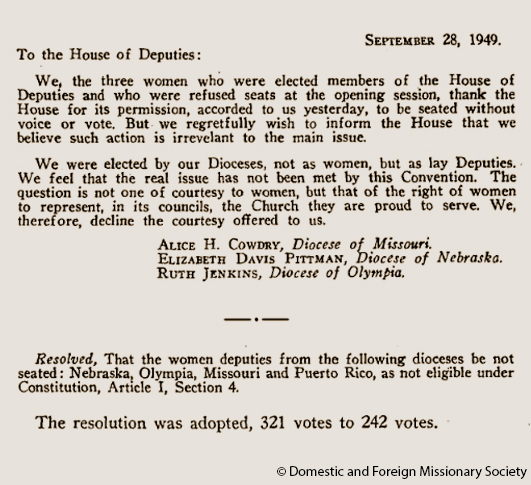Women Deputies
The first attempt to include women in the House of Deputies was made in 1913 by Bishop Benjamin Brewster of Maine, who introduced a constitutional amendment according full rights and privileges to female communicants. The resolution was halted in committee and a substitute amendment was passed declaring it “inexpedient” to amend the Constitution to allow for female deputies. A similar resolution in the House of Deputies, brought by lay deputy Robert Gardiner, also of Maine, was tabled without being voted on for reasons of “inexpediency,” but included a courteous note that the House viewed women’s work with “the highest appreciation.” As historian Pamela Darling notes, “This double message, of ‘highest appreciation’ coupled with the refusal of full participation, set the tone for the next fifty years.” Other options for increasing the influence of women in the church, including the creation of a separate house of churchwomen or allowing diocesan conventions to include women, were also rejected or set aside. Another attempt at constitutional revision to allow female deputies was defeated in 1925.
In 1946, the Diocese of Missouri surprised the church by electing Mrs. Elizabeth Dyer as one of its four lay deputies to General Convention. Mrs. Dyer duly presented herself to be seated at Convention but her legitimacy was challenged. Judge Augustus N. Hand of New York offered a solution, opining that the language of the canons was not gender specific and moving that Mrs. Dyer be seated. The motion passed, and Mrs. Dyer represented Missouri for the remainder of the Convention. In response, the Committee on Amendments judged that the term “layman” was specifically meant to denote the male gender and an amendment eliminating the gender requirement for deputies lost by a mere seven votes. Given that women were the primary force behind much of the growth and mission work of The Episcopal Church, contributing a significant portion of the funding for missionary work around the world, the church leadership's continued rejection of providing women a rightful place among the national leadership of the church was galling.
In 1949, Alice H. Cowdry, Ruth Jenkins and Elizabeth Davis Pittman were elected by their respective dioceses to serve as lay deputies in the House of Deputies. After the Convention voted to disallow their active participation on the basis of gender, they were offered to be seated without voice or vote. In response, the women issued a statement, condemning the actions of the General Convention, which was subsequently included in the Journal of Convention. Despite significant nationwide support for female deputies to the General Convention, women would spend several more decades fighting for their proper seat among the church governance.
In 1964, after the House of Deputies once again rejected women members in spite of the Joint Committee on Structure's recommendation to admit them, Presiding Bishop Lichtenberger was moved to take the unprecedented step of rebuking the House of Deputies for its “unwillingness to face the fact that women are [...] of the laity and members of the Body of Christ.” With that admonishment in mind, the tide against female deputies turned that year, and in 1967 a Constitutional amendment calling for the inclusion of women in the House of Deputies was finally passed.
In 1970, the Constitutional amendment was ratified nearly unanimously, although the Diocese of Rhode Island requested to be polled so that the single “no” vote of its deputation would be a matter of record. As a result of the vote, twenty-eight women deputies to the 1970 General Convention were formally welcomed by President of the House of Deputies, Rev. John Coburn, and were seated amid enthusiastic applause.
In the end, having faced years of setbacks just to find their equal place within the House, women, and the men who supported them, refused to settle for anything less than full equality in the church’s ministry. The story of their gradual, and often frustrating, road to full inclusion in the life and governance of the church is integral to the evolution of today’s more diverse House of Deputies.

Twenty-eight female deputies are formally welcomed by President Rev. John Coburn at the start of the 1970 General Convention. Listen as the vote to seat women in the House of Deputies is narrated by former President of the House, Rev. David Collins.


